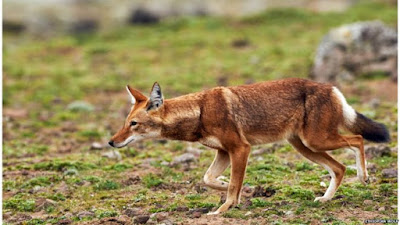Six of the world's large carnivores have lost more than 90% of their historic range, according to a study.
The Ethiopian wolf, red wolf, tiger, lion, African wild dog and cheetah have all been squeezed out as land is lost to human settlements and farming.
Reintroduction of carnivores into areas where they once roamed is vital in conservation, say scientists.
This relies on human willingness to share the landscape with the likes of the wolf.
The research, published in Royal Society Open Science, was carried out by Christopher Wolf and William Ripple of Oregon State University.
They mapped the current range of 25 large carnivores using International Union for Conservation of Nature (IUCN) Red List data. This was compared with historic maps from 500 years ago.
The work shows that large carnivore range contractions are a global issue, said Christopher Wolf.
"Of the 25 large carnivores that we studied, 60% (15 species) have lost more than half of their historic ranges,'' he explained.
"This means that scientifically sound reintroductions of large carnivores into areas where they have been lost is vital both to conserve the large carnivores and to promote their important ecological effects.
"This is very dependent on increasing human tolerance of large carnivores - a key predictor of reintroduction success."
The researchers say re-wilding programmes will be most successful in regions with low human population density, little livestock, and limited agriculture.
Additionally, regions with large networks of protected areas and favourable human attitudes toward carnivores are better suited for such schemes.
"Increasing human tolerance of large carnivores may be the best way to save these species from extinction," said co-researcher William Ripple.
"Also, more large protected areas are urgently needed for large carnivore conservation."
When policy is favourable, carnivores may naturally return to parts of their historic ranges.
This has begun to happen in parts of Europe with brown bears, lynx, and grey wolves.
The Eurasian lynx and grey wolf are among the carnivores that have the smallest range contractions.
The dingo and several types of hyena are also doing relatively well, compared with the lion and tiger.

No comments:
Post a Comment